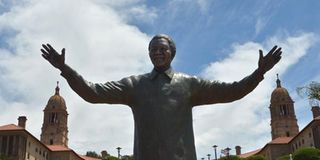Why UK shifted visa services to Pretoria

A statue of Nelson Mandela in front of the Union Buildings in Pretoria.
What you need to know:
- The High Commissioner was honest when he said UK domestic issues informed their decision.
- The British Government has already implemented in other parts of the world all the changes it is now implementing in Africa.
The transfer of the UK visa processing office from Nairobi to Pretoria, South Africa, may have surprised many Kenyans.
Though the British High Commission cited UK domestic reasons for the transfer, the Kenyan media viewed the decision through the lens of what it sees as frosty relations between Kenya and the UK.
While there could be differences between the two governments, the High Commissioner was honest when he said UK domestic issues informed their decision.
The British Government has already implemented in other parts of the world all the changes it is now implementing in Africa, including closing down consulates and merging regional visa services.
In the South Pacific, for example, the UK high commissions in Australia and New Zealand as well as the consulates in the surrounding Melanesia and Polynesia island-states no longer issue visas.
The UK consolidated all visa and immigration services at the embassy in Manila, Philippines, a distance of 6,300 kilometres (eight-hour flight) from Sydney, and 8,000 kilometres (12-hour flight) from Auckland.
Thus, New Zealand and Australia citizens are allowed to enter the UK without visas, but citizens of other countries send their visa applications to Manila.
I missed an academic conference at Bradford University in April this year, though I applied for a UK visa more than a month in advance, because my passport had to go to Manila.
Moreover, the visa I received was written in bold: “No work or recourse to public funds.”
The subtext of this humiliating message clearly shows the domestic issues which are driving the restructuring of UK’s embassies, especially visa and immigration services.
GLOBALISATION
Shifts in the global economic, social, and political spheres in the last 20 years have led to a deepened sense of globalisation, which involves the movement of capital and human resources across national frontiers.
These global shifts have manifested themselves in the UK. The immigration issue is not exclusive to the UK; it affects all of Europe.
Two months ago, far-right parties running on an anti-immigration and anti-EU platform won the European parliamentary elections across Europe.
For example, the UK Independence Party (UKIP) won against Labour and the Tories. Jean-Marie Le Pen’s National Front won in France, while the Danish People’s Party won in Denmark.
PRESSURE ON SOCIAL SERVICES
Three years before this in 2011, British Prime Minister David Cameron said 2.2 million people immigrated to the UK between 1997 and 2009, an influx that placed great pressure on UK’s social services, including housing, schools, healthcare, and welfare.
He then announced policy measures to curb immigration.
Among them were limiting the number of visas for skilled workers from outside Europe, restricting immigration through the marriage route, controlling student visas, and not issuing work permits to foreign students.
This is the crux of the matter in the restructuring of UK’s consulates and visa services. Therefore, when the British High Commissioner cites domestic reasons, he is politely affirming his government’s immigration control policies.
The irony is that, although the UK is a proponent and a beneficiary of global capitalism, these policies are aimed at controlling labour and not capital.
Mr Mbugua is a peace and conflict studies academic in New Zealand ([email protected])




